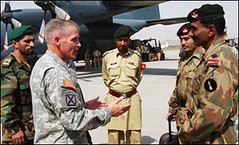By Tech. Sgt. Matt Summers Combined Forces Command-Afghanistan Public Affairs
KABUL, Afghanistan – Senior enlisted leaders from Pakistan, Afghanistan and the United States met for the first time this week to share insights between their respective armed forces and future interoperability.
“Building a relationship between these forces is essential,” said Command Sgt. Maj. Daniel Wood, Combined Forces Command-Afghanistan command sergeant major, the top U.S. NCO in the country.
Wood said he thought it was important to create an enduring engagement plan because the relationship between Afghanistan and Pakistan is important not only to the U.S. mission in Afghanistan, but also to the overall campaign in support of the war on terror.
The meeting, linked to the U.S. Central Command’s Theater Security Cooperation program, coincided with the 18th Tripartite Commission meeting, made up of senior military and diplomatic representatives from Afghanistan, Pakistan, Coalition forces in Afghanistan, and NATO’s International Security Assistance Force. {Click on image for photo details}

1 comment:
Tripartite participants discussed future operations and how the security environment can be better shaped in the region.
The senior NCOs explained the present construct of their respective services, describing promotion systems, professional development paths, and duties and responsibilities of NCOs.
Meetings at Kabul’s Camp Eggers were followed by a visit to the Kabul Military Training Center, the training home for the Afghan National Army.
Sergeant Major of the Afghan Army Roshan Safi, a graduate of the U.S. Army's Sergeant Major Academy at Fort Bliss, Texas, provided a tour of some of the facilities and a close-up view of squad-level tactics.
The Pakistani senior NCOs came away with a greater appreciation for how training is conducted in the Afghanistan army, Roshan said.
“I know they were excited, and when they go back, they will be talking about the training of the Afghan Army,” he said. “And I hope in the future we have a chance to go there (Pakistan) to see how their soldiers are trained.”
Wood, who has experience with Theater Security Cooperation programs in Central and South America, said the information sharing is invaluable.
“Each army does things a little bit different and in some ways drastically different,” he said. “But we can all learn from each other’s experiences.”
Security cooperation programs foster the personal relationships between U.S. military personnel and their counterparts in partner countries, helping to build the trust and confidence needed between allies when they fight as partners against a common foe.
Despite their close proximity and common enemy, the Afghan and Pakistani senior NCOs had never met their counterparts, Wood said. Perceptions or misconceptions were clarified during the dialogue created at the meetings.
Described alternately as “the backbone, the life blood and the fuel that makes the Army go,” Wood said each country’s NCO corps is essential. “You can’t have peace without a military, and you can’t have an effective military without the NCO leadership of people like the ones sitting around the table (here).”
In addition to meeting on a regular basis, the engagement initiative may lead to sending NCOs to each other’s professional development academies and, long-term, a possible NCO exchange program.
“This conference was an ice-breaker that will hopefully lay the groundwork for better working relationships and better communication in the future,” Wood said.
Post a Comment